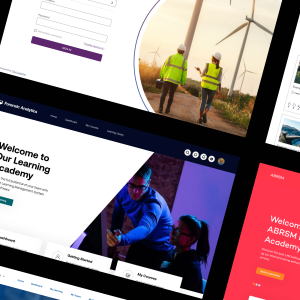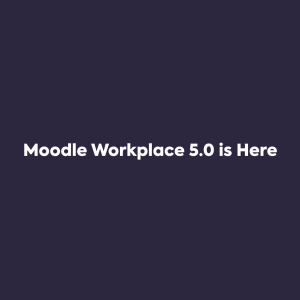Introducing a learning management system (LMS) will have a transformative impact on your business, especially if you’re in the retail sector.
But why are more retail businesses than ever investing in eLearning? And how does an LMS contribute to its success?
In today’s post, I’m answering some of the common questions you’re likely to have if you’re thinking about how an LMS will fit within your business.
What is an LMS?
A “learning management system” (LMS) is a piece of software that allows you to deliver learning online. That could be anything from a single page quiz to a full PhD programme.
There are countless variations, across an increasingly diverse array of sectors.
Feature-wise, an LMS will include different course formats, an area for people to hand assignments in and analytics to track engagement levels. However, that’s just a small selection of the possible features.
When thinking specifically about retail, an LMS is used to support staff training, making it more effective.
This could include introducing your brand values to new sales assistants through an online induction course, outline a newly promoted store manager’s responsibilities or give a visual merchandising team access to up to date store design resources through video integration.
Types of retail training you can deliver with an LMS

Induction training
Delivering induction training through an LMS opposed to some of the other methods available holds various benefits.
Firstly, it provides high levels of consistency, which is an essential part of the customer service aspect of retail businesses. By creating a company-specific induction course, you could turn a full day of face-to-face training into an hour-long digital course that your employees can access from home, and repeat as many times as it takes to feel comfortable with the content.
There are numerous ways to create an induction course when using an LMS. Interactive video, slideshow presentation or simply a series of downloadable documents.
An LMS also has the advantage of maintaining the same, consistent messages over time. In contrast, in-person trainers tend to alter the way they present information over time, so this can cause your employees to be working to different standards.
Health & Safety
Retail is a more hazardous environment than most people think. Those working on the frontlines of your business will come into contact with various dangers, like lifting new stock, using step ladders and working with different types of POS. To reduce the risk to your employees, you can deliver a range of Health and Safety courses online.
A good LMS, which has analytic functionality or a robust report system such as that found in Moodle Workplace, will allow managers and senior staff to monitor the employees are up to date with your safety guidelines and will help to reduce the risk of an accident.
It’s also likely that your team will need to revisit the training periodically, so rather than keeping extensive records (which means more admin) an LMS will take away much of the hard work and automatically prompt you with the information you need.
Compliance training
The past few years have seen the introduction of various new legislations. For example, GDPR came into force a short time ago, and the new regulations left many feeling confused and caught some ill-prepared. The new legislation saw a host of new rules and significant consequences for failing to handle personal data correctly.
With an LMS, you can quickly deploy new courses and circulate them among your team efficiently. That means when a new piece of legislation impacts retail directly, you can be among the first to take action and inform your team. As gathering and processing data is important for retail businesses which have both a high street and online presence, making sure you have a system to share information quickly has never been more important.
Without the use of technology, this would involve an arduous process of booking a subject matter expert, arranging sessions and hiring venues for training days – all of which add up substantial costs.
Similarly to the other types of training, you’ll be able to monitor and report on which team members have accessed the relevant courses and give those who’re yet to take them a nudge.
Visual Merchandising Training
If you’re already investing in top-class visual merchandising, one of the challenges you’ll face is rolling it out across your network. It’s your teams that’ll be responsible for implementing it, therefore ensuring they understand what’s required is crucial.
An LMS allows you to deliver your new merchandising guidelines online via a video or an interactive presentation. It’ll help you achieve a more unified experience in your stores, which will go a long way in delighting your customers, no matter which of your stores they visit.
What’s more, it saves on having to create printed guidelines and distributing them across your network. This means less admin time, reduced cost and an overall more engaging experience.
Continuity Training
If COVID-19 taught us anything, it was that it’s important for retailers to be able to train staff members quickly.
With safety guidelines changing frequently, it meant that in-store staff had to adjust quickly and get to grips with new rules. An LMS helped many retailers do this more effectively, and made the process of passing on new rules as simple as uploading a new course to their LMS.
This turned what could’ve been a nightmare task into a relatively simple process.
These are just a few examples of where an LMS can be used to streamline your training processes. Traditionally, the above types of training would be costly and time-consuming to deliver. However, with an LMS in place, you can reduce the effort needed and the cost associated with it.
Is an LMS just for learning?
e-Learning is the main reason most businesses introduce an LMS.
However, a robust LMS can have many uses which span beyond learning. It can act as your company’s intranet, creating a more connected team. It could be a place to host discussions, which allows you to nurture a positive company culture and can even become a social network specifically for your organisation. There are a limitless number of possibilities if you work with a platform that allows bespoke development.
When a retailer has several stores, allowing your team to communicate with each other socially will mean a better-connected network and an all-round better shopping experience for your customers.
Depending on the system you choose, you’ll be limited in what you can achieve. That’s why we advocate using an open-sourced system like Moodle. The widely available plugins, custom integrations and the ability to customise the platform’s design mean it’s easy to customise and can be thoughtfully tweaked to suit your businesses needs.
When’s the best time to introduce an LMS to your retail business?
Although we’d always suggest implementing an LMS as soon as possible, there are some instances where you’ll see the most benefit.
For example, if staff turnover is high and delivering induction training is becoming a significant expense, you can make cost and times savings by implementing an LMS.
Other instances include when you’d like to help your team develop by giving them access to industry training material like how to manage their sales assistants more efficiently, provide better customer service or even improve organisational skills for rota planning. A learning system will make achieving your L&D goals more attainable.
When you couple that with a content library like Go1, it gives your team access to various learning and development content, so they can develop their skills and become a more valuable team member.
The LinkedIn 2019 Workplace report found 94% of employees would stay at a company longer if they invested in Learning and Development. By providing an LMS, with access to a vast range of content, your employees will feel more valued, and this will lead to higher performance and lower staff turnover levels.
But where do you start? We recommend working with an experienced company like Titus. We specialise in creating innovative learning platforms for organisations of all kinds. If you’d like an insight into the projects we’ve delivered previously, take a look at our case studies.
What difficulties might you face when implementing an LMS for retail?
Before you dive in and invest in an all-singing, all-dancing LMS, it makes sense to think about the challenges that you could face. Here are some of the most common:
Difficulty engaging your team
One of the biggest challenges you’re likely to face is getting your team to engage. Having the right set up is a significant factor that contributes to increasing engagement.
The last thing on your sales assistants mind is the online compliance training that you’ve been nagging them about.
There are many ways you can encourage higher levels of engagement. You could set up automated email reminders which are sent straight to your employee’s inbox. Another way would be to include gamification, which rewards learner engagement with different types of achievements.
Giving managers the right tools, like Intelliboard analytics and the reporting functions available in Moodle Workplace, they’ll be able to identify which team members are engaged, and remind their learners when courses are overdue.
This way, you’ll be able to identify what works best for your unique requirements and adapt accordingly. Taking a data-driven approach, rather than relying on your instincts, allows you to avoid the many of the common pitfalls.
Making it accessible
There are so many different devices out there. And if you’re relying on your employees accessing your LMS with their own devices, this can create issues.
The way around this is making sure your platform is well-designed. Ensuring it’s responsive will make it easy to access from a wide range of devices, ranging from a phone to a desktop computer. Moodle also makes the process of turning your LMS into a Mobile App straightforward, which complements your web-based offering.
This has countless benefits for retailers. Firstly, it’ll mean the hardware you needs to provide within your stores or to your head office team could be anything from a mobile phone, tablet or desktop. Many businesses are allowing their teams to use their own devices, too – which helps to keep your overheads down considerably.
Giving your team time to use it properly
You can’t expect your team to spend their days off completing training courses on your LMS.
That’s why you should consider when they can engage with your platform. Every business is different, and time is often a valuable resource.
It can be challenging to think of taking your team off the shop floor, or away from their day to day jobs.
But, by allowing team members time to focus on their development, it’ll help improve efficiency and strengthen your business into the future. What’s more, with the ability to save progress midway through a course or training programme, if something urgent arises, they can always break from their course and come back to it at a better time.
Making it easy to use
User experience (or UX) is a phrase that’s bandied around a lot when you’re dealing with digital. It’s a bit of a buzz word and is sometimes misused. In essence, it’s about making your platform more comfortable to use.
With retail teams typically containing people of all ages and backgrounds, some people might be intimidated by the prospect of using an LMS. It’s essential to craft an easy-to-use system which is organised and simple to navigate. Beyond that, it’s
By concentrating on making your platform easy to use, it’ll improve the levels of engagement from your team members and create a more well-rounded team.
What’s the best LMS for retail?

Recommendation #1: Moodle LMS
Pros of Moodle LMS:
Integrate your brand entirely.
Moodle LMS is an entirely open-source system, which means it’s possible to customise it heavily. If you’re a very brand-conscious business, you’ll be able to integrate your brand in all aspects of the system.
We offer a comprehensive theming service, where we create a highly customised platform for our clients.
A vast market of plugins
Because of the open-sourced nature of Moodle LMS, there are thousands of community-developed plugins available, which allow you to customise your platform endlessly. You’ll find plugins that help you create a social wall, ways to alter the question types available and adapt your LMS in many other ways.
Integrate with other systems
Another fantastic feature of Moodle LMS is that it can integrate with other systems. You can link it to your CRM, HR and email systems.
Recommendation #2: Moodle Workplace
Moodle Workplace is geared towards making workplace learning more accessible, more engaging and more enjoyable. From automated user tours, to drag and drop report builders, to intuitive, responsive layouts, every aspect of the platform is designed to be easy to use from day one, allowing learners to focus on the content, not the application.
Pros of Moodle Workplace:
Create customisable reports
Moodle Workplace reduces admin time using an intuitive drag and drop interface and allows you to schedule reports to be sent automatically to different audiences depending on their role.
Mirror your company structure
Adapt your platform to your company structure with defined roles and hierarchies to mirror the reporting lines and management relationships which exist within your organisation.
Customise your platform’s design
Moodle Workplace comes with a highly customisable interface and a clear design, making your platform as intuitive as possible for your users and boosting engagement.
Training and compliance programmes
Courses and content are grouped into programmes, allowing you to create easily manageable training paths, and automatically manage certifications and compliance.
For a more comprehensive look at Moodle Workplace, visit our dedicated web page here.
The points above are a great starting point for anyone thinking about implementing an LMS in their retail business. However, there are many other considerations to take into account. Titus is an expert provider of LMS services and works with companies of all descriptions to assist through the journey spanning from the initial ideas stage, through to the implementation and support.
Get in touch with us if you have any further queries or are interested in learning more about how we can help you develop an LMS in your business.







